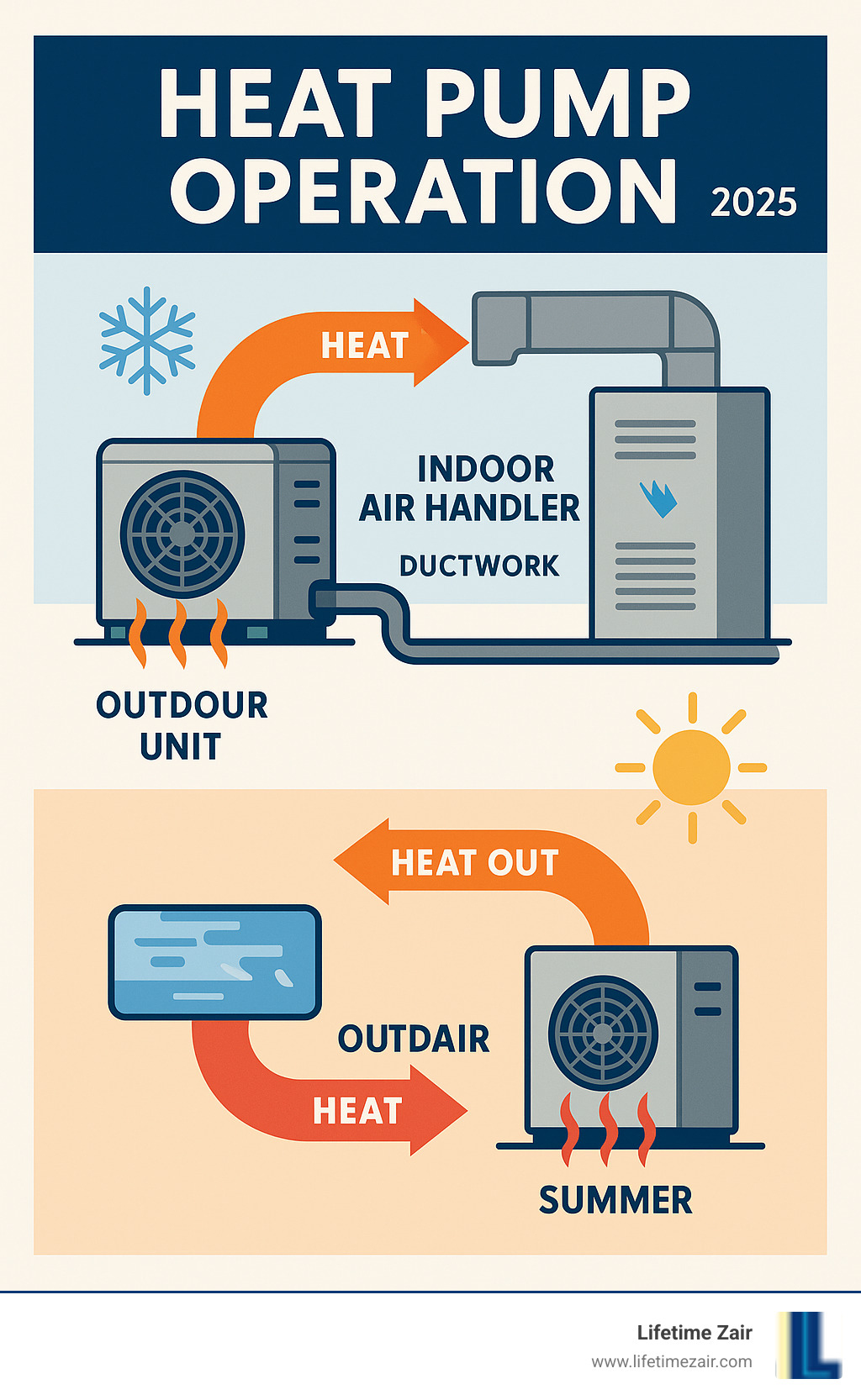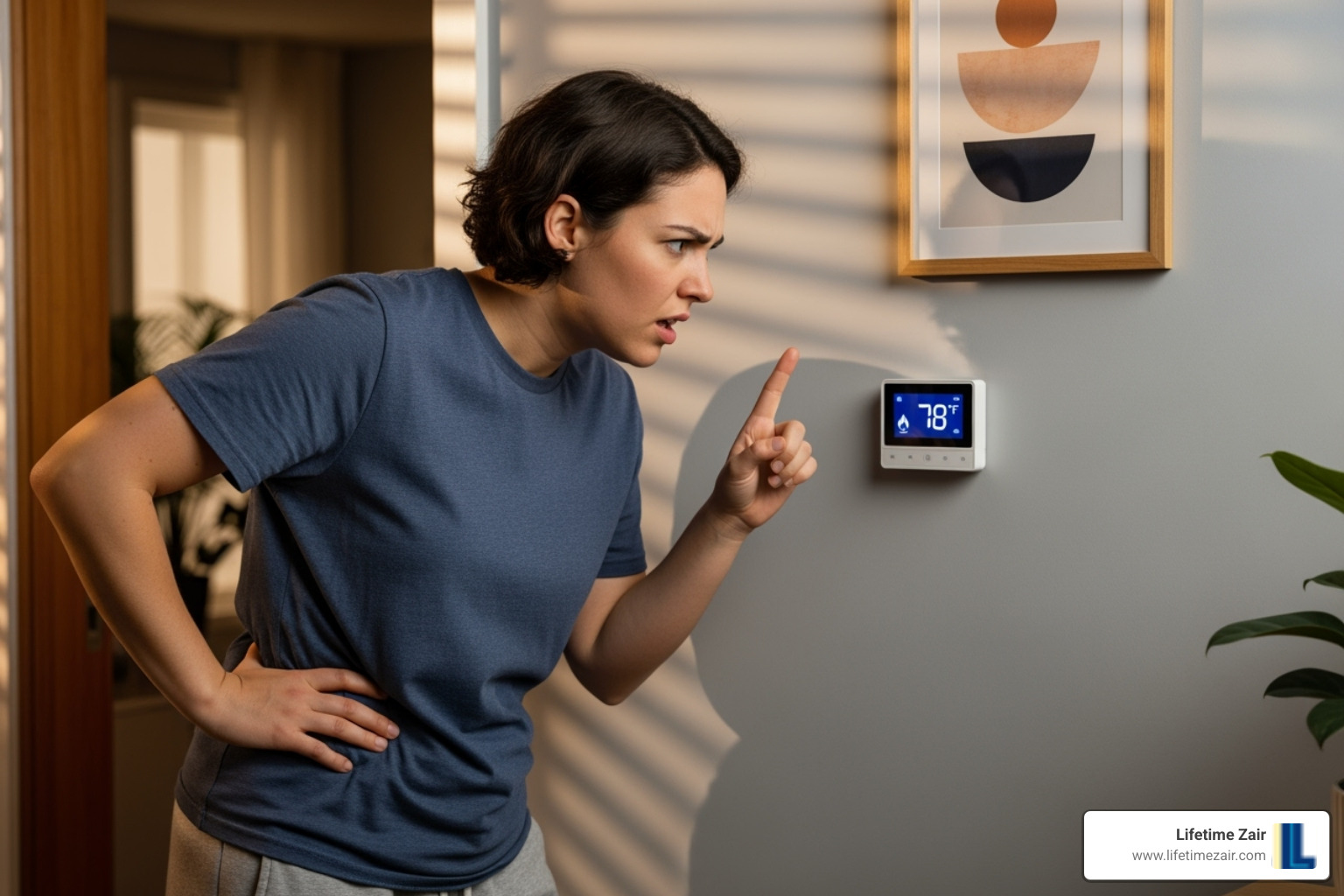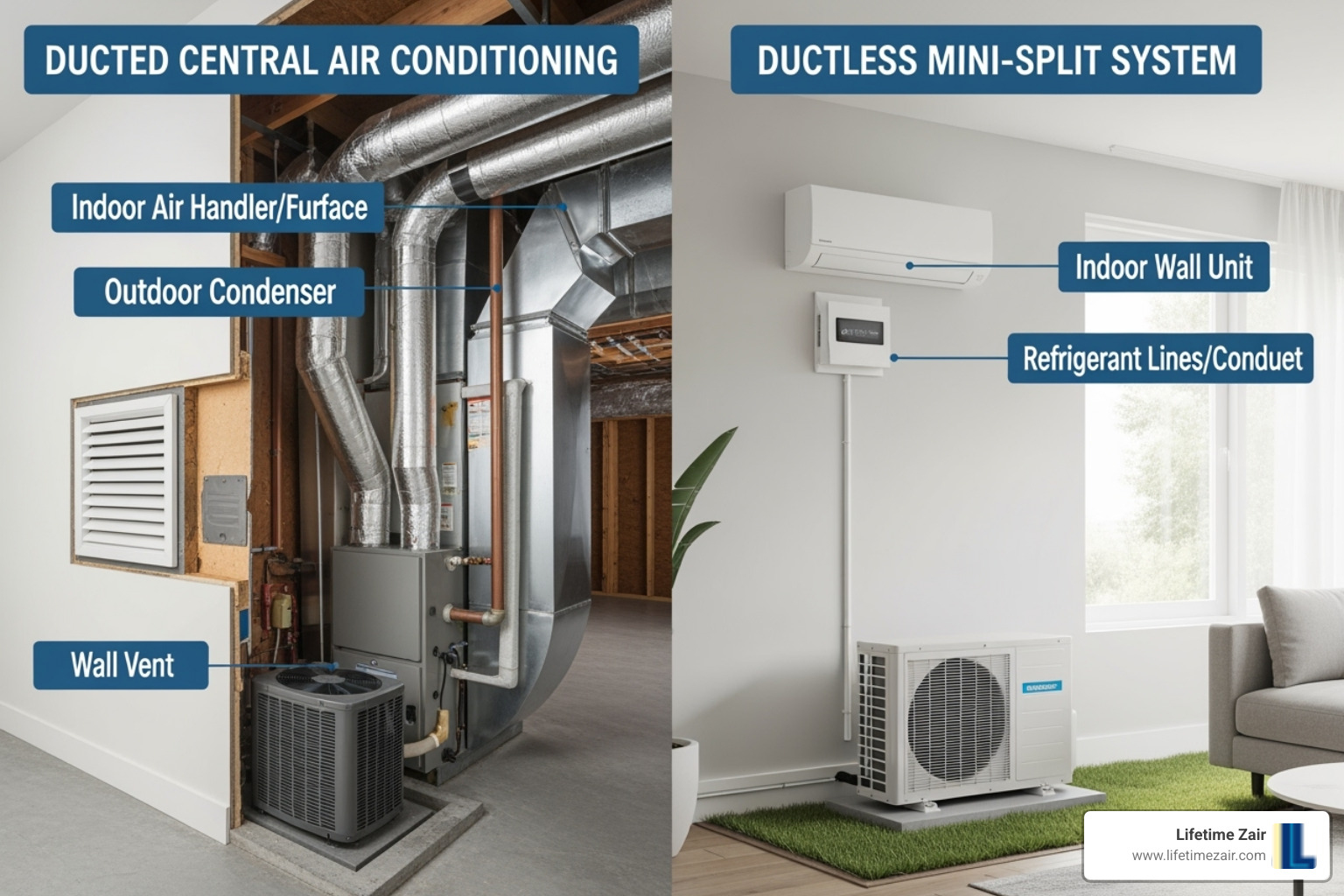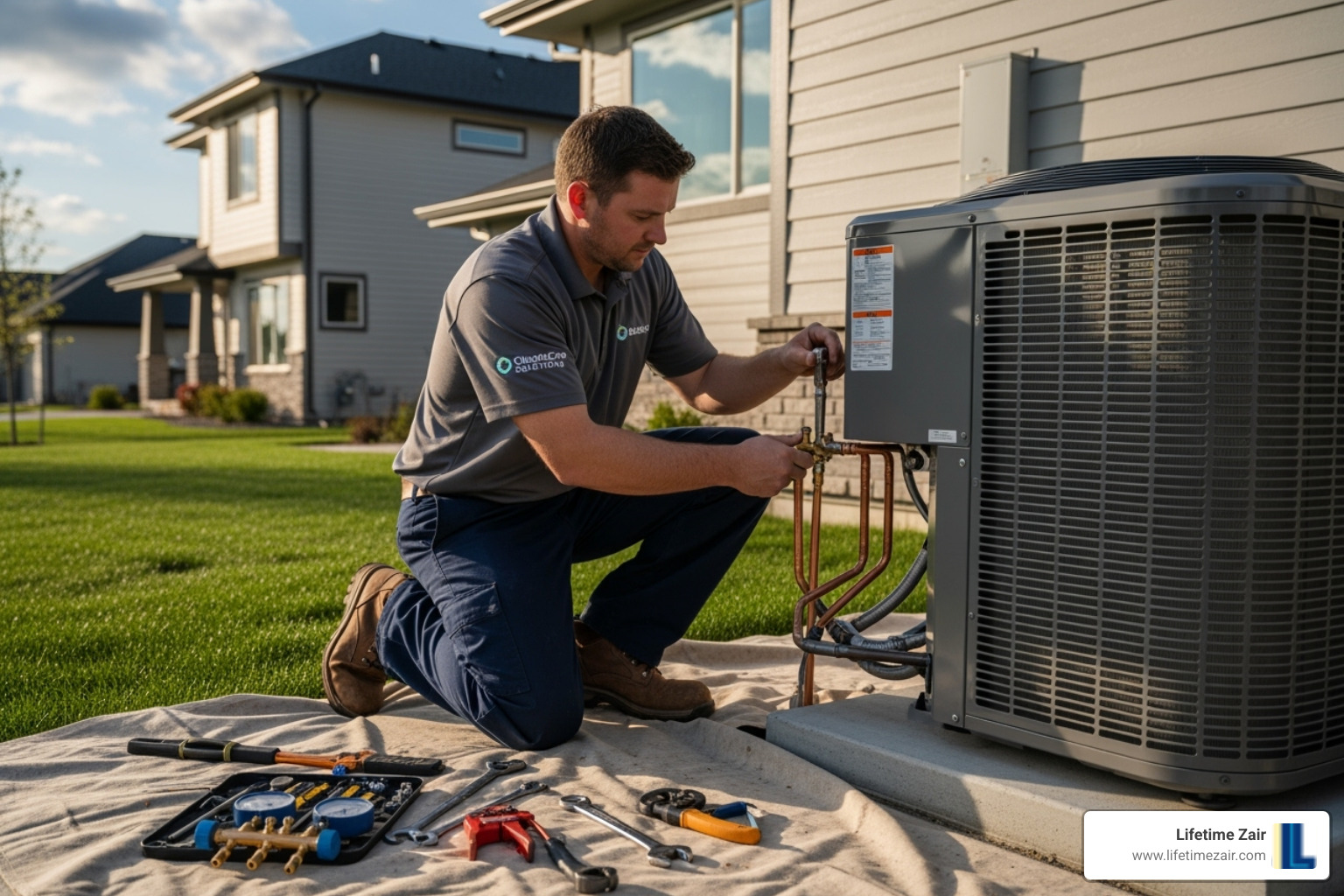Why Heat Pump System Replacement Matters for Your Home’s Future
Heat pump system replacement is a major home comfort decision. Like any major appliance, your heat pump has a finite lifespan, even with excellent maintenance.
Quick Answer for Heat Pump System Replacement:
- When to replace: 10-15+ years old, frequent repairs, rising energy bills, comfort issues
- Benefits: 20-60% energy savings, year-round heating/cooling, improved comfort
- Cost factors: System size, efficiency ratings, ductwork needs, electrical upgrades
- Financial help: Up to $2,000 federal tax credits, state/utility rebates up to $8,000
- Payback period: Typically 5-10 years through energy savings
Heat pumps are highly efficient because they transfer heat rather than creating it. They cool your home by moving heat outside in the summer and heat it by extracting warmth from the outdoor air in the winter.
Modern heat pumps are much more efficient than older models, with a typical lifespan of 10-15 years, sometimes extending to 20 with proper care. The signs you need a replacement are often clear: an aging system, rising energy bills, frequent repairs, and decreased home comfort.
Knowing when to replace your heat pump can save you thousands in energy costs and significantly improve your home’s comfort.
Telltale Signs: Is It Time for a Heat Pump Replacement?
Recognizing the signs that your heat pump is failing can save you from a sudden breakdown during extreme weather. From age and strange noises to high utility bills, let’s explore the indicators that it might be time for a heat pump system replacement.
Your System’s Age and Performance Decline
A heat pump’s age is a key indicator for replacement. Most air-source heat pumps last 10 to 15 years. While some well-maintained units in milder climates like Addison or Dallas might last longer, performance inevitably declines. Older units are less efficient, meaning they use more electricity to provide the same level of heating or cooling due to wear and tear and less advanced technology. Additionally, many older systems use R-22 refrigerant, which has been phased out and makes repairs increasingly expensive.
The Financial Red Flags: Bills and Breakdowns
A noticeable sign of a failing heat pump is in your wallet. Steadily climbing utility bills, without a change in usage, point to your aging system. Upgrading can save homeowners 20% to 60% on energy costs. Frequent and expensive repairs are another red flag. If you’re calling for repairs more than once a season, replacement is often more cost-effective. A good guideline is the “50% rule”: if a repair costs 50% or more than a new unit, a heat pump system replacement is the smarter long-term choice.
If you’re experiencing breakdowns or suspect a problem, don’t hesitate to reach out. We’re here to help you weigh your options: Call us for Heat Pump Repair.
Comfort and Air Quality Clues
A failing heat pump can also significantly impact your home’s comfort and air quality.
- Uneven Temperatures: If some rooms are hot while others are cold, your heat pump may be struggling to distribute air effectively, signaling it can no longer meet your home’s needs.
- Poor Dehumidification: In Texas’s humid climate, a heat pump’s ability to dehumidify is vital. If your home feels clammy even with the AC on, your old unit is likely failing to remove moisture, which can also lead to mold.
- Strange Noises: Your heat pump should be relatively quiet. Loud grinding, rattling, or squealing noises are clear signs of trouble, often indicating worn-out or loose parts. For specific concerns, especially if you’re in the Lewisville area, you can learn more here: Heat Pump Noises in Lewisville.
- Unusual Smells: Burning, musty, or metallic smells from your vents can signal electrical issues, mold, or corroding parts and should be addressed immediately.
- Decreased Airflow: Weak airflow from your vents can indicate a failing fan motor or other internal issues, hindering your system’s performance.
- Short Cycling: This is when the system turns on and off frequently. It’s highly inefficient and damaging, indicating the system is struggling, wasting energy, and accelerating wear.
If you’re experiencing any of these issues, it’s time to consider a heat pump system replacement.
Choosing Your New System: A Homeowner’s Buying Guide
So you’ve decided it’s time for a heat pump system replacement – congratulations! Choosing a new heat pump is a big decision, but understanding the basics will help you select the right system for your home’s comfort and efficiency needs for years to come.
Understanding Heat Pump Types and Technology
Let’s start with the types of heat pumps available:
Air-source heat pumps are the most common type, efficiently heating and cooling homes with existing ductwork, making them ideal for the Texas climate.
Ductless mini-splits are perfect for homes without ductwork or for zoning specific areas, like a new addition. They allow for independent temperature control in different rooms.
Geothermal heat pumps offer the highest efficiency by using stable underground temperatures. While the initial cost is higher, the underground components can last over 50 years.
Modern systems also feature advanced compressor technology:
- Single-speed compressors are the most basic, operating at full capacity or not at all.
- Two-stage systems offer better efficiency by running at a lower capacity most of the time, only ramping up when necessary.
- Variable-speed compressors are the most advanced, precisely adjusting their output to match your home’s needs. This provides the most consistent temperatures, superior humidity control, and the highest energy savings.
Cold climate heat pumps are specially designed to work efficiently in very low temperatures, reducing the need for backup heating. If you’re considering upgrading, explore ENERGY STAR certified options: Switch to an ENERGY STAR Heat Pump.
Here’s how the different compressor types stack up:
| Feature | Single-Speed Heat Pump | Two-Stage Heat Pump | Variable-Speed Heat Pump |
|---|---|---|---|
| Efficiency | Basic | Better | Best |
| Comfort | Less consistent | More consistent | Most consistent, precise |
| Humidity Ctrl | Basic | Better | Excellent |
| Noise Level | Louder | Quieter | Quietest |
| Cost | Lowest | Mid-range | Highest |
Decoding Efficiency Ratings: SEER2 and HSPF2
Understanding efficiency ratings like SEER2 and HSPF2 is key to saving money.
SEER2 (Seasonal Energy Efficiency Ratio 2) measures cooling efficiency. A higher number means lower electricity use during the summer.
HSPF2 (Heating Seasonal Performance Factor 2) measures heating efficiency. A higher number means lower energy bills in the winter.
Higher efficiency units may cost more upfront but deliver significant long-term savings on your monthly bills. Today’s high-efficiency models can reach SEER2 values over 20 and HSPF2 ratings above 10. Your HVAC contractor can help you find the right balance between upfront cost and long-term savings.
The Importance of Proper Sizing and Matched Systems
Proper sizing is the most critical part of your heat pump system replacement. Size refers to cooling and heating capacity (measured in tons), not physical dimensions. A professional Manual J calculation is essential for correct sizing. This detailed analysis considers your home’s insulation, windows, climate, and more, going far beyond a simple square footage estimate.
- An oversized system will “short cycle” (turn on and off frequently), wasting energy, causing premature wear, and failing to dehumidify your home properly.
- An undersized system will run constantly without reaching the desired temperature, leading to high energy bills and discomfort.
For optimal performance, you should replace both the outdoor unit and the indoor air handler at the same time. This is called a matched system. Matched systems are designed to work together seamlessly, ensuring you achieve the advertised efficiency ratings. They also offer better reliability, a longer system life, and are often required for full manufacturer warranty coverage.
While it’s a larger initial investment, replacing both units at once saves on labor costs and may qualify you for more rebates. If you have questions about the installation process, we’re here to help: Questions for Heat Pump Installation.
Proper sizing and matched systems are fundamental to getting the comfort, efficiency, and reliability you deserve from your new heat pump.
Understanding the Heat Pump System Replacement Process and Costs
So, you’ve decided it’s time for a heat pump system replacement. Smart move! Let’s walk through the process and the factors that influence the cost. While every home in Richardson, Plano, or Allen is different, we can outline the key components of your investment. The process involves removing old equipment, installing the new system, and connecting all lines and electrical components—work that requires skilled technicians.
Key Factors in Your Heat Pump System Replacement Cost
Several factors determine the final cost of your heat pump system replacement:
- Unit Size and Type: The system’s capacity and type (air-source, ductless, or geothermal) are the biggest cost factors. Larger homes need more powerful, and thus more expensive, systems.
- Efficiency Level: Higher efficiency units (with better SEER2/HSPF2 ratings) cost more upfront but provide long-term savings on energy bills.
- Labor Costs: These reflect the complexity of the installation and the skill required by licensed technicians for refrigeration and electrical work.
- Ductwork Modifications: Your existing ductwork may need repairs or modifications. Leaky ducts can waste 20-30% of your conditioned air, so fixing them is crucial for efficiency.
- Electrical Upgrades: Some advanced systems may require upgrades to your home’s electrical panel to handle the power requirements safely.
For comprehensive installation services throughout the Dallas area, we’re here to help: Heat Pump Installation Dallas, TX.
Financial Incentives: Rebates and Tax Credits
Now for the good news: significant financial incentives are available for a heat pump system replacement!
- Federal Tax Credits: The Inflation Reduction Act offers a 30% tax credit on eligible installations, up to $2,000. This is a direct dollar-for-dollar reduction in what you owe. You can explore the details here: Inflation Reduction Act (IRA).
- State and Utility Rebates: These vary by location and can be substantial, sometimes offering up to $8,000 for qualifying installations. Check with your local providers for current offers.
- Manufacturer Promotions: Manufacturers frequently run seasonal rebates that can provide additional savings and often stack with other incentives.
We can help you steer these programs to make your upgrade more affordable.
Choosing the Right Contractor for Your Heat Pump System Replacement
Choosing the right contractor is as important as choosing the right system. A poor installation will lead to poor performance. Here’s what to look for:
- Licensed and Insured: Ensure your contractor holds all required licenses and carries comprehensive insurance to protect you and your property.
- Experience with Heat Pumps: Look for a contractor with specific experience installing heat pumps, not just general HVAC experience.
- Positive Reviews and References: Check online reviews and ask for recent local references. A reputable contractor will gladly provide them.
- Written Estimates: Insist on a detailed, written estimate that breaks down all costs after an in-home evaluation.
- Manual J Calculations: A professional contractor will perform a Manual J calculation to size your system correctly, not just guess based on square footage.
- Clear Explanations: A good contractor will clearly explain your options without pressuring you, helping you understand the trade-offs.
At Lifetime Zair, our certified technicians understand that your heat pump system replacement is a significant investment, and we treat it with the care and expertise it deserves.
Frequently Asked Questions About Heat Pump Upgrades
Deciding on a heat pump system replacement brings up many questions. Here are answers to the most common ones we hear from homeowners in Dallas, Plano, McKinney, and surrounding areas.
Are heat pumps a worthwhile investment for homeowners?
Absolutely. Heat pumps are a smart investment for several reasons:
- Energy Savings: The primary benefit is energy savings, typically 20% to 60% on heating and cooling bills, because they move heat rather than creating it.
- Year-Round Solution: They provide a year-round solution for both heating and cooling in one system, simplifying maintenance.
- Lower Carbon Footprint: They use less electricity and can eliminate the need for burning fossil fuels in your home.
- Payback Period: The payback period is usually 5 to 10 years, making it a great long-term investment over the system’s 15+ year lifespan.
Can installing a new heat pump increase my home’s value?
Yes, a new high-efficiency heat pump is a significant energy-efficient upgrade that increases your home’s value. It has strong appeal to buyers who see the potential for lower utility bills and modern comfort. It’s seen as a modern home feature that signals a quality, well-maintained home, and the improved comfort makes your home more attractive to potential buyers.
How does climate affect my heat pump choice?
Climate is a key factor in selecting the right heat pump. Here in Texas, we’re in an excellent climate for them.
- Mild Climates: In climates like ours in Garland, Irving, and Grand Prairie, a standard air-source heat pump is highly efficient for year-round heating and cooling.
- Colder Climates: For colder regions, dual-fuel systems (pairing a heat pump with a gas furnace) are a great option. The heat pump works most of the time, and the furnace provides backup for extreme cold. Alternatively, cold-climate models are specially designed heat pumps that maintain high efficiency even in freezing temperatures.
Optimizing your system for our local climate is important. For tips on getting the most comfort and efficiency, check out our guide: Heat Pump Settings for McKinney Comfort.
The bottom line is that there’s a heat pump solution that works beautifully for virtually any climate.
Conclusion: Making the Smart Swap for Your Home
Choosing a heat pump system replacement is a proactive step toward improving your home’s comfort and finances. You’re moving on from the warning signs of an old system, like high utility bills and strange noises, and embracing modern technology.
Modern heat pumps offer incredible advances, from quiet, efficient variable-speed compressors to high SEER2 and HSPF2 ratings that translate directly into lower energy bills. The result is remarkable improved comfort—even temperatures, better humidity control, and quiet operation. Lower energy bills free up your budget for other priorities.
By acting now, you’re making a proactive decision, choosing the right system for your home and taking advantage of available tax credits and rebates, rather than waiting for an emergency breakdown in the middle of summer.
At Lifetime Zair, we’ve helped thousands of homeowners across our Dallas-Fort Worth service areas make this smart swap, changing their home’s comfort and providing peace of mind. We understand this is a major investment, which is why we offer flexible financing options and help you find promotions to make your new system an achievable reality.
Your old system’s time has passed. The technology, efficiency, and comfort available today represent a quantum leap forward. Don’t spend another season compromising your family’s comfort or watching your hard-earned money disappear into inflated energy bills.
The smart swap is waiting for you. Let’s make it happen together.
Contact us for your Heat Pump System Replacement in Dallas, TX today and find how a new heat pump can revolutionize your home’s comfort while putting money back in your pocket where it belongs.








